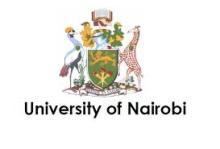Resource information
This article is a contribution to the current debate on the concepts of land use planning and riparian zone
conservation. It discusses some of the major theoretical and conceptual issues that impact on the
practice of planning and conservation of riparian zones within the City of Nairobi. A conceptualization of
planning and conservation of riparian zone as well as the linkage between the two is discussed as the
paper critically seeks to identify some of the planning and conservation strategies in place, policy, legal
and institutional gaps and challenges faced. Drawing from planning and conservation experiences in the
basin from a recent study by the author, the paper has suggested possible strategies for riparian zone
conservation along Nairobi River Basin. Case study was used as the main research design.
Questionnaires and interviews were used to collect data from land users, professionals and public officers
in selected public institutions while documentary data were acquired using archival method from
documents obtained in journals, internet and reports from public and private institutions. It also entailed
use of observation and GIS mapping techniques to capture extent of riparian zones in the study sites. A
total number of 137 respondents participated in the study. Data analysis was done using qualitative and
quantitative techniques. The paper has established implications of land use types, policies and
stakeholders roles, perceptions and behaviour towards riparian zone conservation along Nairobi River
Basin


